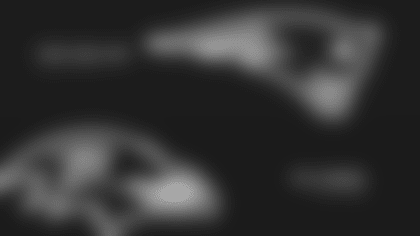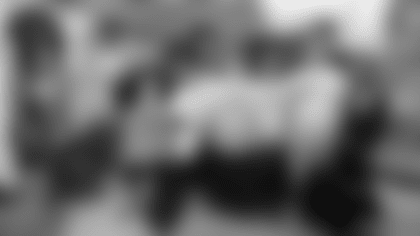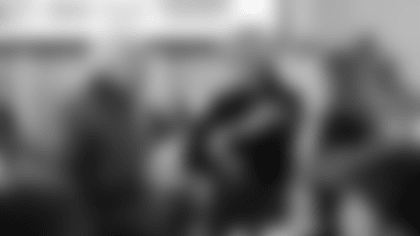Success isn't always a straight line, and often, the plan for how to achieve it is thrown off course to reveal the track you're actually supposed to be on.
Just ask Kyra Caldwell, a student at the Howard University College of Medicine, how she ended up in a fellowship with the New England Patriots as part of the NFL's Diversity in Sports Medicine Pipeline Initiative.
With a bachelor's degree from Columbia and a master's from Georgetown, her stellar resumé might glamorize all the hard work it took for Caldwell to be where she is. Only when she really opens up about her journey do you hear about the dreams she had to first sacrifice.
"It's all about getting over the hurdles, and I'm a hurdler," Caldwell told Patriots.com in her final weeks with the team.
"You have to run over the hurdle. You can't stutter step it. You can't go around it. You have to go over the hurdle, and if you fall, you just continue to run."
Growing up in Ypsilanti, Michigan, Caldwell's family didn't come from a lot of money or privilege, but she was rich in intelligence, work ethic, and energy.
Goal-oriented as a child, she loved books and aced one Accelerated Reader test after another. She recalls the fourth grade, where she racked up more popsicle sticks for her "Milage Club" chart than any student in her elementary school – earned by running laps around the baseball field during recess.
Both reading and running were the first signs of her overachieving, typical of the eldest daughter in a household.
But there was another layer to it for Caldwell, as her father's struggle with drug addiction took a toll on her family. For her, reading and running were also an escape – not just from her thoughts, but as a means helping her and her family get out of that situation.
"As a child in that environment, you have to grow up so quickly," Caldwell said. "You assume a lot of responsibility, and for me, I saw that I wanted something more for my family. I wanted better, so that was a lot of the driving force for who I am today. I don't want them to deal with food insecurity, shelter insecurity, emotional insecurity or any of that dysfunction. So from a young age, teachers told me if I went to college I would have a great life, so I said ok, I have to go to college."
Running track was something she could leverage, and the high school team was a welcoming environment for Caldwell. Her teammates believed in her and she found a great support system where everyone was working towards a common goal.
As she excelled in her events, her coaches not only supported her goals of running in college, but helped her realize her potential might take her even further.
"My coach was a science teacher, and in his classroom he had all of these newspaper clippings of All-American and All-State athletes," she said of Tom Micallef, her high school track coach at Ypsilanti High School.
"He told me I could do this. I could be one of them. That motivated me to keep running and getting better, and I went from someone who was just on the team to becoming one of the top runners. Initially I hoped it would get me to college, but by the end of high school I had dreams of running professionally."
Around the same time, the first seed was planted for what she could pursue when she retired from running. It wouldn't sprout to the surface until college, however.
After experiencing a proximal hamstring tendon tear, Caldwell didn't have health insurance to get treatment, but athletic trainers and physical therapists gave her exercises to get back on track. Along with Micallef, club coaches James Hall and Francis McCauley and the Michigan Accelerators were instrumental in getting her to the college level, traveling around the country with Caldwell her junior year to gain more exposure and become a high school All-American.
She set her sights on collegiate programs that could help her run professionally while also challenging her academically. She found her way to Columbia, where she finally had access to the resources of an Ivy League athlete.
Finally, she was exposed to the trainers, physical therapists, orthopaedic surgeons, and especially the physical medicine and rehabilitation physicians who showed her what a career in sports medicine had to offer.
"The athletic trainers, physical therapists, orthopedic surgeons – they all really helped me extend my career without surgery," Caldwell said. "That opened my eyes in terms of what I wanted to do. I want to be able to help athletes of all ages get back into motion."
At Columbia, she still holds a school record in the 400-meter hurdles, and was enshrined in the Lions Athletics Hall of Fame in 2023. Her athletic journey was even chronicled in a book called Ivy League Athletes: Profiles in Excellence at America's Most Competitive Schools by Sal Maiorana.
After undergrad, she worked for two years under Giants team physician Russell F. Warren in a soft tissue regeneration lab at the Hospital for Special Surgery in New York City, among other jobs in the medical industry to gain experience as she continued to pursue running.
Caldwell received a bit of funding to train with USA Track & Field, setting her sights on the 2016 Olympic trials.
That pesky injury from high school wouldn't subside, however. She kept reinjuring her scar tissue and it impacted her running. As close as she came to her lifelong dreams, she had to give it up.
"It was very difficult," Caldwell recalls of that time. "Since early high school, I was the track star. I was good at it. I was dominant – even in college I was able to win conference titles and get nationally ranked and all that. So for me it was tough to let go of that dream. When you have an idea of what you want for yourself, and you get close but your body can't do it anymore, it's heartbreaking. It was devastating."
At that point, she would have done anything to get back on the track, but that feeling only fueled her desire to help others in similar situations get back to the sport or activity that made them feel alive.
Caldwell went on to Georgetown to earn a master's degree in physiology and biophysics, working and coaching track along the way. When it came time for medical school Howard University's College of Medicine was her top choice.
She appreciated the tradition and prestige that Howard offered, with the school having educated so many great Black doctors in the United States. She was accepted, but during her time at Howard, the COVID-19 pandemic hit. She took a temporary break to go home for the first time in almost a decade.
It was a humbling time, according to Caldwell, but in hindsight it was necessary.
She worked for a medical device company and drove for Lyft as she worked on her mental health. Her family and community back in Michigan continued to support her. She assured them she was going to finish what she started.
"I was able to lean on my family and my community once again," Caldwell said. "A lot of people kept up with my journey to that point and they saw it wasn't a straight path in medicine."
This was just another hurdle for her to clear – something she had gotten quite good at over the years.
She recalls a time in high school when she was only starting to recognize her athletic talent. Caldwell was winning her race, but stumbled over the penultimate hurdle as an opponent pulled ahead. She kept going, and Caldwell ultimately still won the race.
Years later during this hiatus from med school, she remembered that important life lesson.
"When you hit a hurdle you have to hold your composure," Caldwell said. "Remember your form. Remember what you practiced so long for. Trust your body. It's the same thing with the goals for your career and really, your life."
Caldwell stayed the course. She returned to med school, and this fall, completed her fellowship with the Patriots.
Arriving at Gillette Stadium, she was blown away by the resources available to athletes, and saw how welcoming everyone was. From her direct superior to head coach Jerod Mayo, everyone knew her story when she arrived.
She saw the tangible difference she was making translate to the field, exposed once again to all the possibilities available to someone with her passion and work ethic.
Caldwell will finish up her doctorate, and from there, hopes to be a team physician at any level. She would love to be working with the Olympics in a medical capacity, performing minimally invasive procedures, but the NFL has now peaked her interest after her time with the Patriots.
She also sees herself being happy working with high school or college aged athletes.
Thinking back to the injury that got her here on this path in the first place, she recalls how not having health insurance could have changed the trajectory of her life if she didn't have a connection to seek treatment.
Maybe one day she opens a clinic for underserved athletes who don't have access to complete care.
"I think that's a very important part of my journey and a goal for myself as a physician in general," Caldwell said.
"Just being able to affect change at the high school level so that it's easily accessible for young athletes to get the care they need and live out their fullest potential in their sport.
However it plays out, Caldwell knows following her faith and passions will get here where she needs to be.

















































